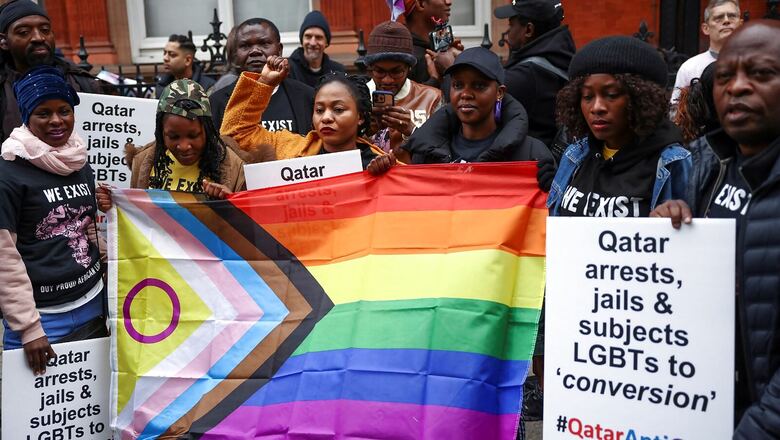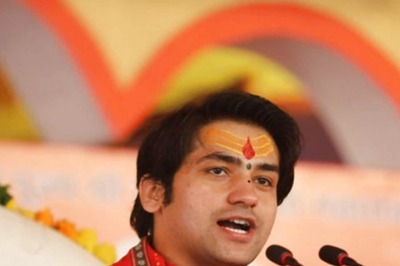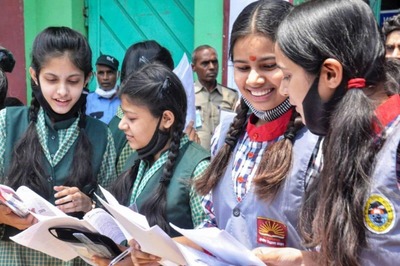
views
Al-Jazeera has always been vocal about human rights violations in India. This year alone it has come out with almost a dozen articles and reports, raising question marks over its credentials as a democratic, secular nation. Some of the headlines can be self-explanatory — “Can Narendra Modi stop hate speech in India?” (18 April 2022), “Islamophobia is the norm in Modi’s India (10 June 2022), “Modi’s critics have a precarious life in India” (28 June 2022), “As India turns 75, there is little to celebrate” (15 August 2022), “Attack on a dream: Muslims in fear as Indian democracy turns 75” (15 August 2022), “Hindu nationalists now pose a global problem” (26 September 2022), and very recently, “Concerns over free press in India after NDTV’s Ravish Kumar quits” (1 December 2022). Ironically, Al-Jazeera is busy writing obituaries about the country which, as per American professor Salvatore Babones, “is the only institutionalised democracy between South Korea and Israel”.
Given its India reporting, Al-Jazeera would appear to be a paragon of libertarian values. But then that’s where the Orwellian nature of the broadcaster appears. For, here’s a media organisation that takes the high moral, democratic, secular, liberal ground, but owes its existence to a regime that is autocratic, Islamist, and non-pluralistic in nature. Al-Jazeera, which calls itself the first independent news channel in the Arab world, is owned by the Emir of Qatar who, according to Hugh Miles (Al-Jazeera: How Arab TV News Challenged the World), granted the network a start-up of $137 million. In the following years, as per another report, “hundreds of millions of dollars” were annually granted for the running of Al-Jazeera.
As Qatar hosts the 2022 FIFA World Cup, and at a time when the country finds itself in the line of fire on the issue of human rights violations and migrant labour deaths, one realises the importance of Al-Jazeera in the Qatari scheme of things. As per reports, more than 6,500 migrant workers from India, Pakistan, Nepal, Bangladesh and Sri Lanka have died in Qatar since it won the right to host the World Cup 10 years ago. But the piercing journalism of the broadcaster is badly missing. Yes, Al-Jazeera America did a story, “Qatar migrant workers die by hundreds”, but the dateline was 18 February 2014. Most of the stories done, especially in recent times, by Al-Jazeera projected the Qatari government’s version while reporting the news. Here are some of the headlines: “Qatar rejects Amnesty report on ‘unexplained’ labourer deaths” (26 August 2021), “Qatar official slams ‘hypocrisy’ of World Cup criticism” (4 November 2022), “Qatari minister slams Western media coverage of World Cup record” (15 November 2022), “The massive hypocrisy of the West’s World Cup ‘concerns’” (28 November 2022). And of course, Al-Jazeera played up the FIFA president slamming Western ‘hypocrisy’ over Qatar criticism. So much for its independent journalism!
If Al-Jazeera failed to report on basic human rights issues, then one can understand its silence on Qatar deciding to go back on its promise to allow beer to be sold in the stadiums. After all, under the Shari’ah, alcohol is firmly regulated in Qatar and drinking in public is punishable with an imprisonment up to six months. Only a non-Muslim can buy alcohol, only after getting a permit, and drink at home. The same policy is applied to the sale and usage of pork products. Such official rigidities have never offended the secular, libertarian sensibilities of Al-Jazeera, which is ever-ready to write an obituary on India’s democracy and secularism. Qatar’s anti-LGBT stand too has never unsettled the preachy journalists of “the first independent news channel in the Arab world”.
Like master, like slave
Maybe in some way, Al-Jazeera epitomises its patron-in-chief. In June this year, for instance, Qatar was in the forefront in raising the Nupur Sharma case, accusing the then BJP spokesperson of “disrespecting” Prophet Mohammed. But in less than five months, the same Qatari administration, which took a high moral ground of not disrespecting any religion or its religious head, sent an official invitation to Zakir Naik, an Indian fugitive, to give “religious lectures” during the ongoing World Cup.
Naik, as per India’s Ministry of Home Affairs’ notification, dated 30 March 2022, has been accused of “extolling known terrorists, and proclaiming that every Muslim should be a terrorist”. Naik has also been charged with “promoting forcible conversion of the youth to Islam, justifying the suicide bombings, posting objectionable comments against Hindus, Hindu gods, and other religions, which are derogatory to other religions”.
The double-standards don’t stop there. For, the same Qatari administration, which has been so sensitive on matters of Islam, had in the year 2010 given citizenship to MF Husain, an Indian painter accused of hurting Hindu sentiments by painting their gods and goddesses naked. Incidentally, Husain had once made a painting of Mahatma Gandhi, Karl Marx, Albert Einstein and Adolf Hitler, wherein the German dictator alone was shown naked. When asked the reason behind this, Husain reportedly said that he wanted to “humiliate” Hitler! One wonders if Hindu gods and goddesses faced the same ire from the famed Muslim painter.
Qatar’s dual personality has ingrained so deep into its psyche that it today hosts a number of American military installations, which had previously been based in Saudi Arabia. The country has three US military bases, including Al Udeid, just south of Doha, which is one of the largest American Air Force bases outside the United States. Yet, Qatar is the generous host of the most Islamist forces the Americans have been fighting against, or had fought in not-so-distant past — from Al-Qaeda, Taliban and ISIS cadres to Muslim Brotherhood and Hamas leaderships. The Qatar leadership is also close to Iran, and so it is to Israel, making this country a diplomatic powerhouse in the region.
Qatar’s most potent weapon
Qatar is blessed with oil and natural gas — around 55 percent of the country’s GDP can be attributed to the two natural resources. But more than the abundance of oil and natural oil, it is Qatar’s soft power— largely pushed and promoted through Al-Jazeera — that has invariably made the Arab nation geographically the size of Delhi punch over and above its weight!
Al-Jazeera is Qatar’s most potent weapon that also carries with it the tag of deniability. The Arab nation can unleash the state-owned broadcaster upon anyone it views as inimical — or at least a rival — and later claim to have no role in all this.
Tal Samuel-Azran, in his book Intercultural Communication as a Clash of Civilisations: Al-Jazeera and Qatar’s Soft Power, shows how each and every trend in Al-Jazeera’s coverage of various events, such as the Arab Spring, is coordinated with Qatar’s interests in mind. Qatar would not just legitimise and mainstream non-state Islamist actors, especially the Muslim Brotherhood, but also use Al-Jazeera to achieve its political objectives during the Qatari-Saudi conflict in 2007. Once the negotiation with the Saudis was achieved to Qatar’s satisfaction, the state broadcaster stopped being critical of Saudi affairs. Samuel-Azran writes that Al-Jazeera “moved to the other extreme, with zero negative reports about Saudi Arabia, and broadcasted only positive news… to emphasise the friendships and similarities between Qatar and Saudi Arabia”. The leaked diplomatic cables written by the US envoy to Qatar too suggested that the 2007 Qatar-Saudi resolution agreement included “a promise that Al-Jazeera would cease criticising Saudi Arabia altogether”.
The Qatar-Al-Jazeera link was also exposed by Mohammed El-Nawaway and Adel Iskandar who, in their book Al-Jazeera: How the Free Arab News Network Scooped the World and Changed the Middle East, raise the issue that Al-Jazeera, though criticising “everyone”, ignores Qatari affairs altogether. The authors note that when they asked the broadcaster about it, the management answered that the reason Al-Jazeera never criticises Qatar’s affairs is that nothing worth mentioning is happening in “boring” Qatar.
It’s incredible that despite having such an obvious and deep nexus with the Qatari state, Al-Jazeera has managed to present itself as a credible broadcaster. “Al-Jazeera ‘plays the journalistic credibility game’ better than all the other state-sponsored networks,” Samuel-Azran explains, “because it promotes Qatari interests only in critical situations; that is, it gains credibility with 99 percent of its routine coverage and leverages that high credibility in the 1 percent of cases when Qatar really needs it to promote its crucial interests. In such times, Al-Jazeera operates as a servant of an autocratic ruler, utilising its credibility to gain immense clout and assist Qatar’s goals.”
In sync with Western media
In Al-Jazeera’s defence, however, it can be said that this anti-India bias is just not confined to this broadcaster. Last year, The New York Times had posted an online advertisement for the job of a South Asia Business Correspondent based in New Delhi. And one of the requirements sought for the position was that the candidate had to be critical of Prime Minister Narendra Modi and his “muscular nationalism”. NYT never had any such preconditions for postings in China. Likewise, the Time magazine, in its 2020 essay on Prime Minister Modi, accused him of not just “rejecting pluralism” but also “stifling dissent”. The same magazine, on its cover page printed during the 2019 Lok Sabha elections, called the Prime Minister “India’s Divider in Chief”!
The same moralistic, overbearing tone can be found in the articles of The Economist, The Guardian and The Washington Post, which, like NYT, have become a melting pot of activists like Arundhati Roy and Rana Ayyub who are projected as India experts! Roy can at least claim to be a Booker winner, though this doesn’t make her an India expert, Rana Ayyub doesn’t even have that ‘qualification’. Ayyub has written a bogus book on the 2002 Gujarat riots whose claims have been rejected by none other than India’s highest court!
The Western media seems to be suffering from the white supremacist syndrome, finding it hard to swallow India’s democratic success story, though the dominant Leftist intellectual ecosystem in the West too has its role in all this. As a media outlet that has hired journalists mostly from the West, Al-Jazeera is the heady cocktail of the white supremacist syndrome and the Middle Eastern complex vis-à-vis India. It combines the worst of the two biases — and the result is the mass production of the anti-India story. Ironically, India is among the very few flourishing democracies in the region. And Qatar, the patron state of Al-Jazeera, is definitely not one of them.
The author is Opinion Editor, Firstpost and News18. He tweets from @Utpal_Kumar1. Views expressed are personal.
Read all the Latest Opinions here




















Comments
0 comment